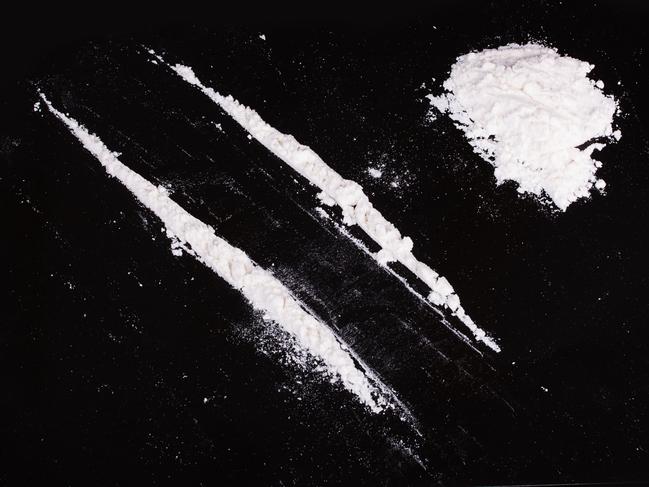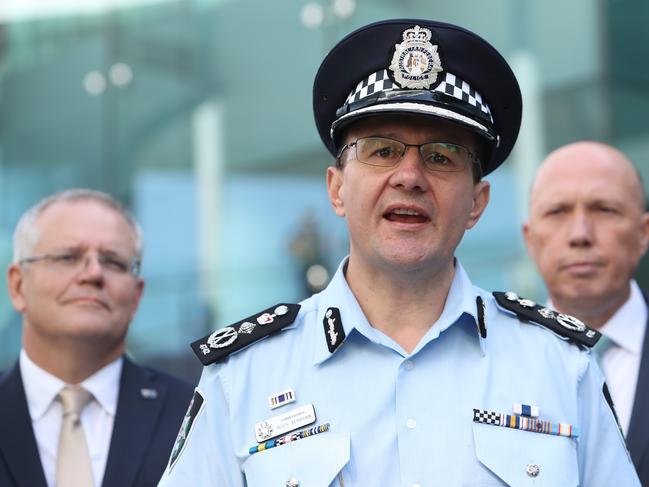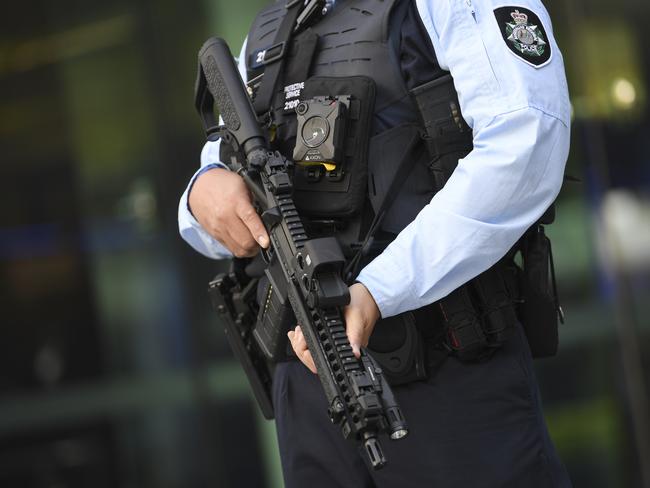From cocaine to child porn and misuse of undercover identities: What police have been up to
Explosive documents have blown the lid off a shame file revealing the improper and illegal acts committed by Australian Federal Police officers who have consorted with criminals, boasted about access to cheap cocaine, and had sex with the victim of a crime.
Crime in Focus
Don't miss out on the headlines from Crime in Focus. Followed categories will be added to My News.
Exclusive: They have consorted with criminals, assaulted people, misused credit cards, been drunk, abusive, taken illicit drugs, boasted about their access to cheap cocaine, and had sex with the victim of a crime they were investigating.
One cop was found with child porn, one with unauthorised ammunition and explosives, and one tried to get a friend off a traffic infringement notice.
Another was caught stealing from a colleague during a training course.
A different cop told lies about an inappropriate relationship.

A string of reports about cops behaving badly around the country obtained by News Corp under Freedom of Information (FOI) laws have revealed the worst cases of Australian Federal Police officers misconduct in the past two financial years.
The AFP, after months of haggling over what would be released under FOI, suddenly opened up its records to reveal the most serious misconduct cases – after the new AFP Commissioner Reece Kershaw took over.
As a result the AFP handed over the files for 23 cases of inappropriate and illegal behaviour from cops in NSW, Victoria, Queensland, and the ACT.
Among the most serious involved a female police officer who had been given an undercover “assumed” identity and used it “recklessly” for nefarious purposes.
An investigation report showed the female police officer used her status to get access to a male criminal while he was being held in the cells of Central Local Court in Sydney.
MORE NEWS
How a cop on $120K gambled $1m in eight years
Former bikie headkicker appointed to AFP
‘Intimidating’: The day cops raided me at work
The officer also did not report telephone calls and letters she sent and received from the criminal.
She used a pseudonym to attempt to contact him, and to visit a NSW prison inmate three times.
The police officer also continued her relationship with the criminal even after being told by her supervisors to “cease all contact” and then submitted a false integrity report to deliberately mislead the AFP about her conflict of interest with the man.
The Professional Standards report into her behaviour said the officer “maintained a relationship” with the criminal “who she knew was adversely criminally recorded and failed to advise the AFP about them for three years she breached the AFP’s Code of Conduct and consorted with the criminal.”
The documents shows she eventually resigned and her file was marked “permanently unsuitable for re-employment with the AFP”.

An officer posted to an overseas mission was found to have acted disrespectfully making inappropriate comments and using profanities and to have fraternised (had a sexual relationship with) a local citizen.
The AFP has previously explained in federal parliament hearings that fraternisation, a sexual relationship, relates to places like the Solomon Islands, East Timor and Afghanistan where there is a perception of a power imbalance between the locals and AFP officers stationed there.
Any officers being posted overseas have been given clear instructions not to fraternise with the locals.
The most common misconduct by AFP officers was the misuse of police credit cards with 48 alleged breaches in the past financial year.
MORE NEWS
Tech-giant Bose closes stores nationwide
The new battleground for car makers
Revealed: celeb beards that need to go
One case revealed in FOI documents shows one officer on a spending spree bought items worth $6,183.85 and $2,994.00 using his work-issued credit card.
The number of overall alleged misconduct incidents in 2018-2019 was 653 a slight drop from the previous year.
Out of those complaints 437 were made against AFP police around the country and 216 against ACT police.
Most of the complaints about officers (58 per cent) were made by fellow officers and members of the public (34 per cent).
And the number of breaches that were proven to be true in the last financial year was 327 and not proven to be true 405.
Some matters finalised in the 2018-2019 year were complaints made in the previous year.

The most misconduct breaches which were established as proven to be true were misuse of credit card, 48, failure to comply with procedures, 47, inappropriate conduct/behaviour, 24, accessing information, 21, accessing information.
There were seven proven cases of criminal misconduct.
The AFP annual report for 2019-2019 shows overall the number of the most serious breaches has remained steady for the past two years.
Category 4 which covers corruption issues is up overall in numbers during the past four years from 69 to 80 breaches.
Category 3 which covers serious misconduct but not corruption is down slightly in the past four years from 246 breaches in 2015-2016 to 197 in 2018-2019.

An AFP spokesman said the numbers show the number of misconduct matters accepted for investigation based on a complaint but not necessarily established.
“Whilst the number of allegations are slightly up in relation to Category 4, only of those conduct breaches finalised in 2018-19 had a finding of ‘Established’,” he said.
“These breaches relate to alleged conduct giving rise to corruption and, due to the AFP’s mandatory reporting were referred to the law enforcement watchdog Australian Commission Law Enforcement Integrity.”
Originally published as From cocaine to child porn and misuse of undercover identities: What police have been up to
